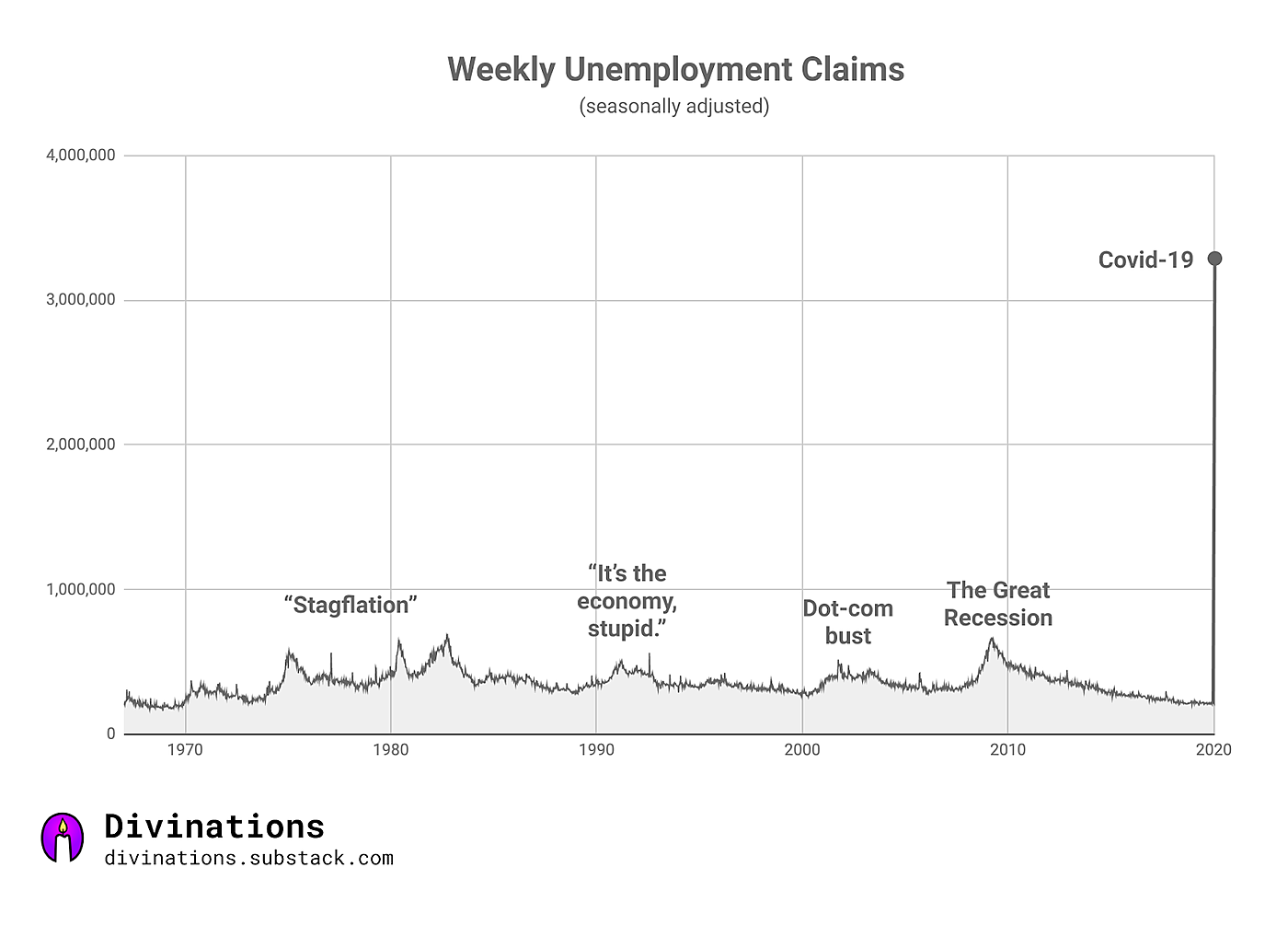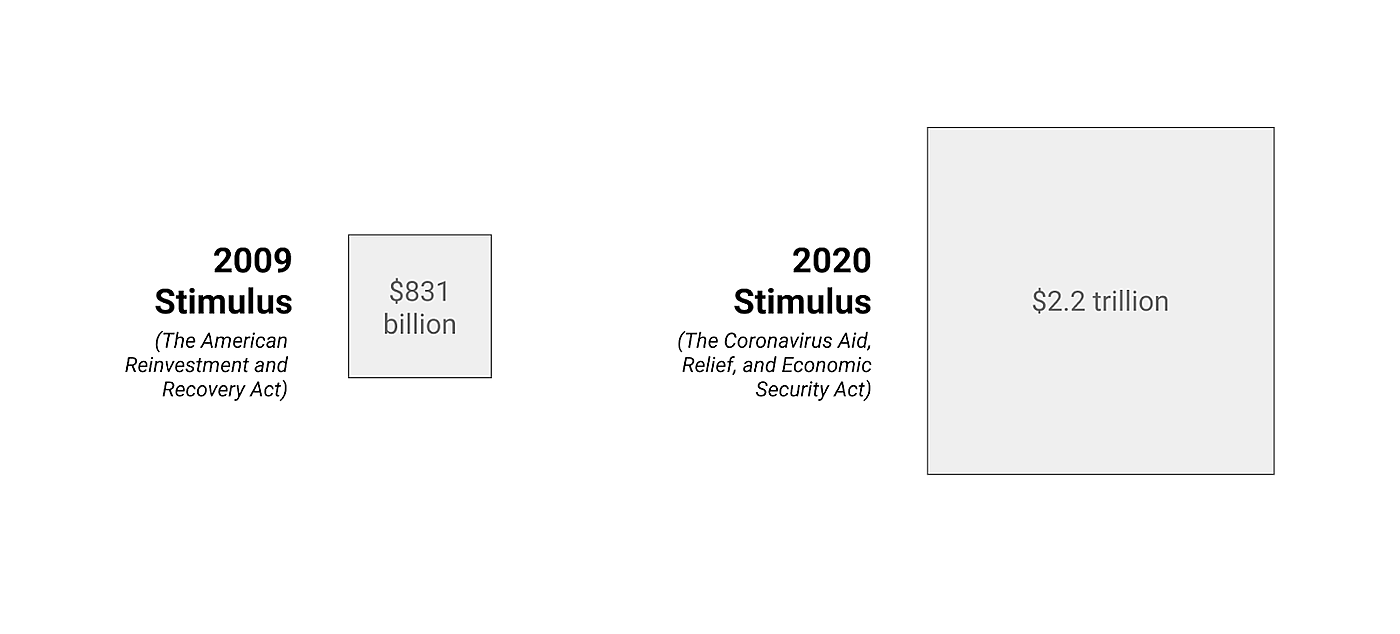
To listen to an audio edition of this essay narrated by me, click here.
Your brain works fine without new oxygen for a minute or two. But past the three minute mark, you’ll lose consciousness. As each minute passes, 2 million brain cells die, causing increasingly irreversible damage. Once ten to fifteen minutes have elapsed, there’s no turning back.
It works the same way with money. All economic beings — businesses and consumers — can go a little while without income. But wait too long, and the harm becomes permanent. We might have to cancel plans, lay off workers, or lose our homes. And if we go without cash for too long, we’ll shut down.
As everyone now knows, we’re currently experiencing the sharpest cutoff of economic oxygen in living memory. Most recessions are triggered by a financial bubble bursting, like stocks in 1929, technology companies in 2000, and subprime mortgages in 2008. These shocks often feel confusing at first and then bleed slowly into the economy as the effects unfold.
But today, the cause is immediate and obvious: the economy is holding its breath because it’s the only way to escape a global pandemic without losing tens of millions of lives.
How bad is this going to be compared to previous recessions?
One good leading indicator to look at is the amount of people that are filing for unemployment insurance. Unlike the stock market, which moves up and down depending on the mood of speculators, unemployment insurance claims reflect the real conditions people are facing on the ground. As you may have heard, it was measured at 3.2 million last week.
To put that in context, here’s the history of initial unemployment claims going back to 1967, when the Department of Labor first began publishing the statistic.
It looks like a spreadsheet error:
It’s terrifying. We’re looking at a week with nearly 5x more unemployment claims than the worst weeks we have on record — and that was last week. The weeks to come may be even worse.
It’s important to remember: this is just one metric. It’s bad, but it doesn't necessarily mean we’re in for more pain than we experienced in previous recessions. Nobody knows how this will unfold.
“All our efforts to predict what will happen next are largely guesswork,” explains Matt Yglesias, Senior Correspondent at Vox. “Recessions have happened in the past, but they come on slowly. The kind of sudden stop in economic activity that we are looking at is well outside the realm of anything we’ve experienced.”
The good news is, even if the US was initially slow to respond, huge swaths of the population are now sheltering in place. Masks, ventilators, and tests are being manufactured and distributed where they’re needed — to an extent. It’s not clear that the federal government is doing enough, but tens of thousands of people are working hard to beat the virus as best they can.
And Congress is on track attach the biggest financial ventilator in modern history to the American economy:
Well, now. What to do next?
Clearly this is an unprecedented event. Like Pearl Harbor and 9/11, it will cause permanent change. But what can we do? What strategies will guide us through our personal challenges, keep our businesses afloat, and save our economy from spiraling into collapse?
Normally, this newsletter is focused on applying lessons from the field of strategy to help businesses achieve profitability and growth. But then everything changed. It felt impossible for me to just keep doing the same thing, but I didn’t know what I could do that would help.
So I started researching the current situation. I saw that although there is now a well-developed public conversation around handling the public health crisis, the public conversation about managing the economic crisis was less advanced.
We seem stuck in a place where you have some people questioning whether the “solution is worse than the cure,” and other people rightfully pointing out that tens of millions of deaths, a crashed healthcare system, and the likely shunning we’d get from the global community would hurt the economy too.
I’d like to do whatever I can to help move the conversation forward.
Of course, plenty of people are talking about the Covid-19 recession. Economists are publishing proposals, Congress is passing legislation, and new information is whizzing around the internet as soon as it emerges. But I couldn't find anyone taking the time to zoom out and help me understand the big picture. I wanted someone to walk me through the mechanics of what’s happening, so I could get a more intuitive grasp of it.
Then I realized: maybe this is something I can help with.
...
So: what is happening? A good place to start is by understanding the fundamental dynamics of how recessions work, and why this one is so different.
Most financial panics are caused by events that are hard to understand. The mechanics of the coronavirus recession, on the other hand, are sort of obvious:
The Only Subscription
You Need to
Stay at the
Edge of AI
The essential toolkit for those shaping the future
"This might be the best value you
can get from an AI subscription."
- Jay S.
Join 100,000+ leaders, builders, and innovators

Email address
Already have an account? Sign in
What is included in a subscription?
Daily insights from AI pioneers + early access to powerful AI tools









Comments
Don't have an account? Sign up!